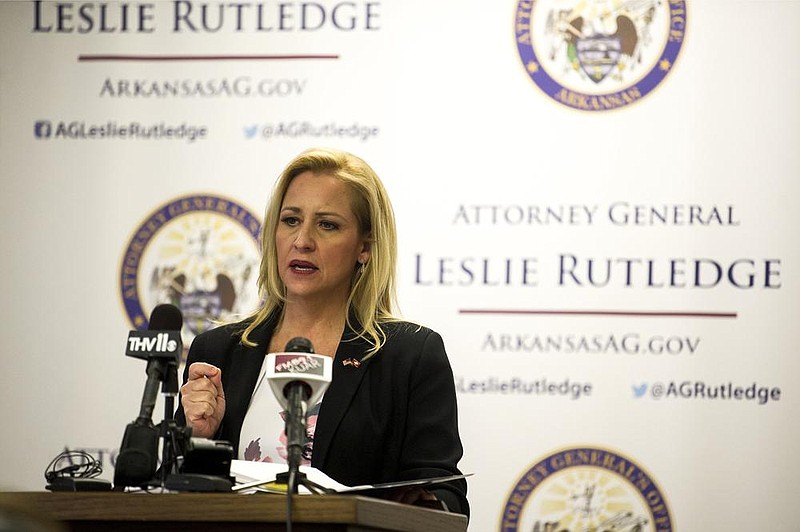The office of Attorney General Leslie Rutledge declined this week to compare how it responded in 2018 and this year to temporary restraining orders issued by circuit judges against state Plant Board rules on dicamba use.
The attorney general's office quickly contested three such orders in 2018; it hasn't contested a similar order, first filed May 21, then extended on Monday in Pulaski County Circuit Court.
The office represents the Plant Board, and almost all other state agencies, boards and commissions, in litigation. It was first asked by the Democrat-Gazette on Tuesday whether it would comment on a temporary restraining order by Circuit Judge Morgan "Chip" Welch. The office was then asked on Wednesday to compare its response to Welch's order with the responses in 2018.
On Thursday afternoon Rutledge's office issued a statement: "I am fighting for our farmers and reviewing all options to Judge Welch's order. The livelihood of many Arkansas farmers hinges on their ability to use Dicamba right now during this critical planting and growing season."
The office declined further comment on the lack of response to specific questions or to say whether it will seek a stay of Welch's order or file an appeal with the Arkansas Supreme Court.
In 2018, the attorney general's office faced a flurry of temporary restraining orders against the Plant Board's April 15 cutoff on spraying dicamba that year. Farmers wanting a longer spray season went to court, asking circuit judges in their local judicial districts for help.
The judges issued the restraining orders in ex parte decisions, meaning they did so without informing the attorney general's office of hearings to consider the requests. Ex parte hearings are legal, under some conditions.
In Mississippi County on April 12, 2018, without a hearing, Circuit Judge Tonya Alexander ruled in favor of 114 farmers and farming entities and granted a temporary restraining order. Rutledge's office asked the Arkansas Supreme Court for a stay of Alexander's order the next day and filed an appeal on April 17.
In Phillips County on April 13, 2018, without a hearing, Circuit Judge Christopher Morledge ruled in favor of some 80 farmers in a motion identical to the farmers' filing in Mississippi County. Rutledge's office filed a motion on April 16 to have Morledge's ruling dissolved.
In Clay County on April 16, 2018, without a hearing, Circuit Judge Randy Philhours ruled in favor of 37 farmers. The attorney general's office asked the Supreme Court for a stay on April 18 and filed a formal appeal April 19.
The Supreme Court put all three orders on hold within a few days of the attorney general's filings.
A fourth judge, Circuit Judge Melissa Bristow Richardson, in Jonesboro, refused the request by farmers in her district after a hearing that included the presence of the attorney general's office.
John King III of Helena-West Helena, president of the Agricultural Council of Arkansas, said Wednesday that Welch's order "creates many problems for Arkansas farmers who have suddenly seen the rules changed at an absolutely critical time in managing crops in the ground."
Welch's restraining order against the Plant Board's 2021 dicamba rule, including a June 30 cutoff on using dicamba, means the May 25 cutoff of 2020 is in effect. The 2020 rule also included much larger buffers separating fields where dicamba is applied from fields with crops susceptible to the herbicide.
Welch hasn't had a hearing yet on the merits of the lawsuit, which cites a litany of alleged legal flaws in how the Plant Board came to adopt the new rule. The Arkansas Administrative Procedure Act sets out how state boards and commission can change rules and regulations.
"While we don't always fully agree with the rules established by the State Plant Board, we believe they are best suited to establish rules for Arkansas agriculture given their mission, their extensive knowledge, and the lengthy reviews of a complex set of information and scientific data," King said in a statement distributed by his association. "Having a court, after a brief review of the situation, establish a separate set of rules at this stage of a growing season creates a multitude of burdens for farmers and the industry at large."
According to the most recent weekly crop-progress report by the U.S. Department of Agriculture, farmers in Arkansas have planted 71% of this year's soybean crop. That rate of planting is slightly higher than the 56% rate at this time a year ago and 66% five-year average.

